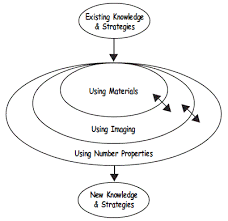“Children are always learning.”
Rebecca Brooks, The myth of ‘catching up’ after Covid-19
As restrictions continue to ease in NSW, I have resumed some of my support and professional learning with primary schools via Zoom. One of the first things I have been reiterating to teachers is, don’t feel the pressure to ‘catch up’. My major concern is that the rhetoric of ‘catch up’ being touted by those not actually in the classroom, may be causing unnecessary stress on classroom teachers. Thankfully, most teachers I have spoken with are not feeling that pressure to somehow ‘cover’ work students have ‘missed’, but are working tirelessly to find out where students are at and where to next.
British PM Boris Johnson recently recommeded that UK teachers needed to create catch-up plans for students. Mike Ollerton’s (@MichaelOllerton) reply to the tweet pretty much summed up my thinking towards the idea of ‘catch-up’. The proposal of trying to catch up on concepts students have missed, only creates more gaps and more content to be ‘covered’. But this is only if you see learning and education as just filling students with information – which I, and most teachers don’t. If you see learning as an ongoing journey of development, and teaching as the act of meeting students at their point of need – then nothing in the way we teach should, or needs to change. We’ve just moved the ‘usual goalposts’ back a bit to allow breathing room for teachers to teach and students to learn.
Having ‘caught up’ on what sts didn’t learn during ‘lockdown’, won’t they then need to catch up on what they would’ve but weren’t learning whilst they were catching up?🤔
— Mike Ollerton (@MichaelOllerton) June 17, 2020
Instead of catch up, I’ve been encouraging teachers to see this as a time to assess, monitor and revise major concepts. In mathematics, there are a number of concepts that are essential as building blocks for other, more complex thinking and working. Concepts such as place value and the structure of number, the four operations and their relationships, and developing efficient strategies for operating with numbers, are all foundational concepts that can be focused on right now.
Another great way to see the current situation, is not catch up, but recovery. I have to thank Dr Helen J Williams (@helenjwc) for sharing on Twitter a fantastic article, The myth of ‘catching-up’ after Covid-19 by Rebecca Brooks. The article encapsulates much of what I wanted to say, both in valuing what some students have learned while at home, and acknowledging the difficulties, challenges, and inequalities that this time in our students’ lives has brought into sharp focus.
“‘Recovery’ acknowledges that the impact of this crisis has been far wider than ‘missed learning’ and that we will need to begin where children are, rather than focus on where we would like them to be, and how to get them all to that same point as quickly as possible.”
Rebecca Brookes, The myth of ‘catching up’ after Covid-19
Recovery requires time. It requires time for teachers to plan. It requires time for teachers to assess. It requires time for students to just sit with an idea, or a piece of knowledge, or to just ‘play’ with a concept or strategy. Within NSW there is external pressure with the current NSW curriculum review and also the looming review of the Australian Curriculum that may take some of this time away from teachers are new curriculum planning begins. For me, it was interesting that many of the changes I suggested in my feedback on the NSW curriculum review – removal of NAPLAN, a choice in what outcomes to teach and assess, removal of the A to E grading – have all been put on hold during Covid-19. It would be interesting to have feedback from teachers to see if these changes have assisted in giving them time to teach (albeit in a very complex situation). Could these changes stay?
In thinking about how to assist students, we need to concern how understanding grows. Students who appear to have lost momentum in their learning, or have returned with wider gaps in some areas, are still on their journey. Pirie and Kieren (1994) talk about students’ development of understanding. In their research regarding fractions, Pirie and Kieren coined the phrase ‘folding back’ when describing how students learn. A student’s developmental learning pathway is not a straight line, it’s not even a curve, it’s a recursive process. Pirie and Kieren talk about how when students face an unknown mathematical concept or problem, and as the difficulty increases, they return to known strategies to cope with the changes, this is their ‘folding back”. We can learn much from research like this along with other research into student’s development of learning (such as Clements and Sarama’s learning trajectories. Wherever we go to from here, it will be forward.
References
Pirie, S., & Kieren, T. (1994). Growth in mathematical understanding: How can we characterise it and how can we represent it? Educational Studies in Mathematics, 26(2), 165–190. https://doi.org/10.1007/BF01273662






